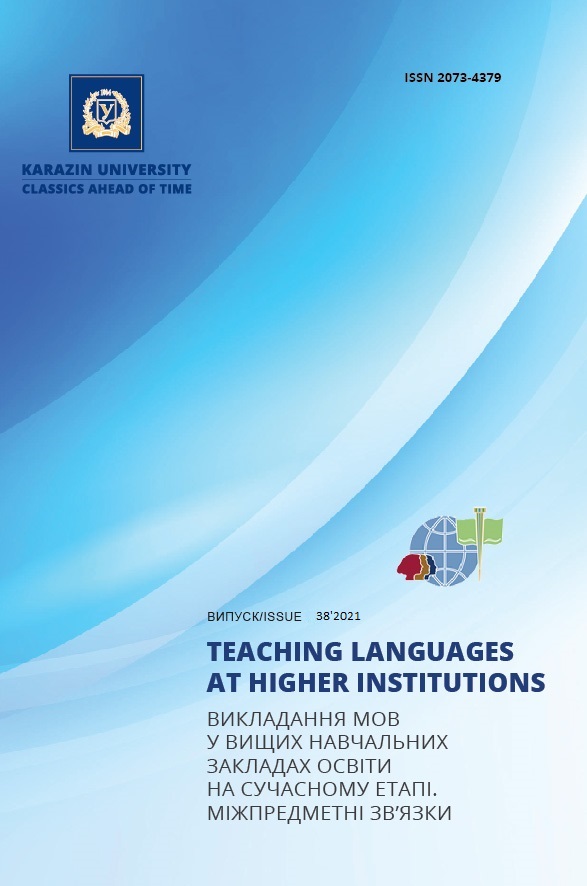Formation of principal language competencies in the German language in the process of distance learning at higher educational establishments
Abstract
This article presents the topical issue of possibilities to implement the competence approach into the process of teaching foreign languages while shifting to distant learning. Applying empiric methods of investigation (interview of the participants of the teaching process; direct observation of implementation of distance learning at a higher educational establishment; analysis of lecturers’ reports), and being guided by their own empiric experience, the authors are searching for the optimal methods to implement the competence approach in the online sphere. The authors’ viewpoint on the organization of distance work on the subject “A Second Foreign Language (German)” is based on the practical experience of using the Office 365 online learning platform. They have described the teaching tools offered by the platform and found them optimally satisfying the needs of teaching the above-mentioned subject for most indicators. There is the necessity to employ a single teaching environment, which is determined by the need to observe a strict learning schedule, establish the interaction of the participants of the teaching process, and organize the independent work as well as the assessment of the learning activity. By comparing the possibilities of the traditional live lesson with those of the online class, it has been found out, that both forms of lessons allow implementing the concept of competence approach to linguistic education at the same efficiency level. While describing the main features of this approach, the authors have shown the possibilities to interpret traditional didactic tools in a new way and pointed out several advantages of online studies, brought out in the process of teaching a foreign language (German), i.e. an increase of motivation for learning activities due to the interactive mode; activation of communicative interaction of the learning process participants; autonomy and actualization of self-study. A promising direction of the research within the theoretical field is the methodology of forming digital competencies for the participants of the learning process and, in the practical aspect, it is necessary to develop a system of IT tools aimed at the needs of foreign language teaching, where the interdisciplinary connections are of great importance.
Downloads
References
Grebinnyk, L.V. (2018). Instrumentarii ta vymohy do studenta u vykladacha pry zastosuvanni zmishanoho navchannia inozemnym movam. [Tools and requirements for students and teachers in the application of blended learning in foreign languages]. Vykorystannia modeli zmishanoho navchannia pry vykladanni inozemnykh mov: tezy dopovidei mizhvuzivskoho naukovo-metodychnoho seminaru [The use of the model of blended learning in teaching foreign languages: abstracts of interuniversity scientific and methodological seminar (Kyiv, 21.03.2018)]. Kyiv: Kyiv National University of Trade and Economics, pp. 26‒29 [in Ukrainian].
Zakon Ukrainy Pro vyschu osvitu from 01.07.2014 no 1556-VII [On higher education: Law of Ukraine by order 1556-VII dated July 01, 2014]. (2017). Available at: https://zakon.rada.gov.ua/laws/show/1556-18. [Accessed 20 January 2021] [in Ukrainian].
Zakon Ukrainy Pro osvitu from 05.09.2017 no 2145-VIII [On education: Law of Ukraine by order № 2145-VIII dated September 05, 2017]. (2017). Available at: https://zakon.rada.gov.ua/laws/show/2145-19. [Accessed 20 January 2021] [in Ukrainian].
Ryabova, Z.V. and Yelnykova, H.V. (2020). Profesiine zrostannia pedahohiv v umovakh tsyfrovoi osvity [Professional growth of teachers in the conditions of digital education]. Informacijni tehnologii i zasoby navghannya [Information technologies and learning tools]. 80 (6), pp 369–385. Available at: https://doi.org/10.33407/itlt.v80i6.4202 [Accessed 20 January 2021] [in Ukrainian]. DOI: https://doi.org/10.33407/itlt.v80i6.4202.
Spirin, O.M. and Kolos, K.R. (2020). Tekhnolohiia orhanizatsii masovoho dystantsiinoho navchannia uchniv v umovakh karantynu na bazi platformy Moodle [Technology for organization of distance learning for students in quarantine on the basis of the Moodle platform]. Informacijni tehnologii i zasoby navghannya [Information technologies and learning tools]. 79 (5), pp. 29–58. Available at: https://doi.org/10.33407/itlt.v79i5.4090 [Accessed 20 January 2021] [in Ukrainian]. DOI: https://doi.org/ 10.33407/itlt.v79i5.4090.
Boldrini E. (2010). Zentrale Bedeutung und Potenzial des Kompetenzkonzepts im Bildungsbereich [Central importance and potential of the competence concept in the education sector]. EP – EDUCATION PERMANENTE. Schweizerische Zeitschrift für Weiterbildung [Swiss journal for continuing education] [in German].
Goltsev, E. and Bredthauer, S. (2020). Ein Schlüssel zur Förderung mehrsprachiger Kompetenzen im Schulunterricht: Selbsterfahrung in der Lehrkräfteprofessionalisierung [The key to promoting multilingual skills in school lessons: self-awareness in teacher professionalization]. Die hochschullehre [The university teaching]. 6/2020, pp. 17–34. Available at: www.hochschullehre.org. [Accessed 20 January 2021] [in German]. DOI: https://doi.org/10.3278/HSL2002W.
Niveaustufen des Europäischen Referenzrahmens [Levels of the Common European Framework of Reference]. Available at: https://www.hueber.de/deutsch-als-fremdsprache/lernen/pg_niveaustufen_lrnzg [Accessed 20 January 2021] [in German].
Schäfer, E., Mordel, J. and Mendzheritskaya, J. (2018). Zwischen den Sprachen. Ein Konzept zur Förderung der fremdsprachlichen Kompetenz von Lehramtsstudierenden im fachdidaktischen Seminar Französisch [Between languages. A program for improving the foreign language competence of student teachers in the didactic seminar on the French language]. Die hochschullehre [The university teaching]. 4/2018. Available at: www.hochschullehre.org. [Accessed 26 January 2021] [in German]. DOI: https://doi.org/10.3278/HSL1827W.
SIG Arbeitsgruppe 3.1. (2017). Gemeinsamer europäischer Referenzrahmen für Sprachen (GER) und Europäisches Sprachenportfolio (ESP) [Common European Framework of Reference for Languages (GER) and European Language Portfolio (ELP)]. Available at: https://www.idt-2017.ch/images/03_fachprogramm/02_sig/SIG_3-1-Bericht_GER_und_ ESP_20170403-IDT2017.pdf [Accessed 20 January 2021] [in German].
Ziener, G. (2009). Bildungsstandards in der Praxis. Kompetenzorientiert unterrichten [Educational standards in practice. Teaching based on competence]. Berlin: Kallmeyer [in German].

